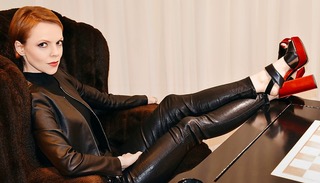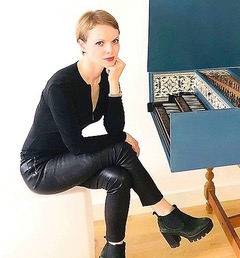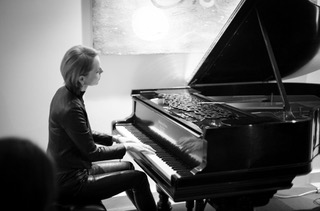Magdalena Baczewska: Scriabin'cris Sonate-Fantasy as starter
 After I discovered you thanks to your recordings ‘A Tribute to Glenn Gould’ (Goldbergvariations, Holophon 9112) and Piano works of Chopin and Szymanowski (Paraty PTY 116137) I wanted to learn more about you and found details, partly on your website www.magdalenaNYC.com, but a lot remained vague. Therefore this attempt to fill in more details. As far as I could find out you were born in the Silesian mining town Zarbrze. Did you come from a musical family?
After I discovered you thanks to your recordings ‘A Tribute to Glenn Gould’ (Goldbergvariations, Holophon 9112) and Piano works of Chopin and Szymanowski (Paraty PTY 116137) I wanted to learn more about you and found details, partly on your website www.magdalenaNYC.com, but a lot remained vague. Therefore this attempt to fill in more details. As far as I could find out you were born in the Silesian mining town Zarbrze. Did you come from a musical family?
Indeed, my family comprises professional musicians: my mother is a pianist (teaching at the Szymanowski Music Academy in Katowice, Poland), my father is a singer (now retired member of the Silesian Philharmonic Chorus), and my younger sisters (who are twins) play the violin and viola in professional orchestras in Poland and Spain. I have fond memories of the sounds of us all practicing together that made our apartment sound like a conservatory. I suppose our neighbours were less amused.
At five years old you started playing the piano. Was that on your own wish or did your parents want to give you a general musical education?
I am told that the decision to send me to piano lessons was made because I was not very nice to my little sisters, and my parents wanted to give me something to do. While this may be true, I do remember going up to the piano as a child, and playing by ear the tunes I had heard in the Soviet cartoons that were broadcast on Polish television at the time.
My greatest luck was to have had a marvellous and inspiring first teacher. While my mom often helped me practice, she thought it would be wiser if I wasn’t her piano student. I still remember my first piano lesson, and keep in touch with my first teacher, Jadwiga Górecka, the wife of the late composer, Henryk Mikołaj Górecki. Her profound respect and love for music and art have stayed with me since.
Have you ever considered another instrument?
I really wanted to learn the guitar in high school. But since by then I was participating in piano competitions and bringing back prizes, the school authorities decided that I needed to focus on the piano, and, very importantly, keep my nails short. The music school I attended was not an extracurricular activity - it was a very serious, specialised institution, which meant business. One did not argue with the administration.
At what age did you decide to become a professional musician?
For some reason, there was never a question in my mind that I would become one. My parents didn’t have a babysitter, which meant that my sisters and I would often come to their concerts. I loved the atmosphere of focus and intensity surrounding the music making. Having attended countless concerts during my childhood, I had a full understanding of the hard work and serious discipline necessary. I also got to observe various pre-performance routines and post-performance celebrations. It all made perfect sense.
Did you go to a music school or a conservatory in Katowice?
I went to elementary and secondary music school. Both of these schools offered top-notch, very rigorous musical education, meant to prepare one for a career in music. Our science coursework was quite limited, in order to allow more time for the study of music.
There followed a route to competitions. What memory do you have of them? One of them was at the International Chopin Competition in New York, another the Mieczyslaw Munz competition. What memories do you have about them and were they important for your career?
I was nine when I first competed. Although I did bring home prizes from nearly all competitions I attended, I never really enjoyed the experience of competing - it had very little to do with the music making I saw in concert. I never understood how one could measure something so esoteric as music. It took me fifteen years to realise that I didn’t have to do this to myself. It is interesting to observe how little the competition prizes mean these days. Some of the greatest musical careers have been built entirely without them.
Then Jerome Rose discovered you and invited you to study at the Mannes College of Music in New York where you earned your Bachelor’s in 2001 and Master’s summa cum laude in 2003. Do you remember the program you played?
How could I forget?! The piece I played when I met Jerome Rose was Scriabin’s Sonata-Fantasia in gis from 1886. The energy in that session felt like electric current. I was fifteen at the time.
In general, my time at Mannes was a period of self-discovery and experimentation. I learned a great deal of repertoire, from the Brahms Concerti, to pieces for piano and electronics. During that time I also discovered the harpsichord and the entirely new universe of musical aesthetics.
You then studied with Contance Keene at the Manhattan School of Music, where you earned your Doctor of Musical Arts Degree. What was special about her teaching?
Constance Keene was the ultimate grande dame. Her sense of style, both in life as well as at the piano, was always impeccable. My lessons with her always felt glamorous, and had an element of a high ritual. This was an important takeaway for me: spending time with great music is always a special occasion. On a purely pianistic level, I am still trying to figure out how a woman who weighed 76 pounds was able to create such a powerful sound on a piano - it seemed to carry forever. I would have loved to spend more time with her, but her passing interrupted our studies together.
The title of your doctoral dissertation is ‘In search for Bach’s cantabile: The role and aspects of oratory and singing in keyboard interpretation’. It is published in 2009 by Lambert Academic Publishing. Tell me a bit more about it.
I was very intrigued by Bach’s preface to his Two-Part Inventions and Sinfonia’s, where the composer invites the music lovers to not only learn to play in two and three parts, “but most of all to achieve a cantabile style of playing.” What could he possibly have meant by cantabile? It certainly was not the definition of the word known to us today, through the bel canto style. I was compelled to find out.
Did you know that conductor Nikolaus Harnoncourt operated along the same lines of ’speaking music’?
Harnoncourt’s book Music as Speech has been an important influence in my research. As someone who often performs Baroque works on the piano and the harpsichord, I learned a great deal from Harnoncourt’s experience and thoughts on finding ways to perform that respect the tradition, while keeping the so-called ‘early music’ alive for the 21st century audiences.
Then there is a link with France where you are the recipient of a Prix du piano at the Festival conservatoire américaine in Fontainebleau.
The Fontainebleau experience was life-changing for me: I was able to study music in the enchanting setting of Chateau de Fontainebleau, while also observing the work of the architecture students, who worked next door. The experience not only awoke the francophile in me, but also created lasting friendships and collaborations. Intellectually, it also helped me widen my horizons and delve more deeply into the world of art in general. It is not by coincidence that twenty years later I found myself in Paris, teaching a music humanities course combined with art humanities. For six weeks, together with Prof. Harrist, my Columbia colleague teaching the art humanities portion, I hold daily lectures and outings to museums, monuments, and various musical events that Paris has to offer. I am certain that the seed of that passion was planted in Fontainebleau.
There is also the harpsichord player Magdalena Baczewska. Did you have special teachers for this instrument? 
I discovered the harpsichord when I was a student at the Mannes College, through a harpsichord course offered to pianists. At the time, the so-called early music was not yet mainstream, and when I started playing the harpsichord, it felt like discovering a hidden treasure. Aside from learning to play the instrument, I started studying the important treatises on playing the music of that period. I was astounded by the variety of styles, repertoire, and the world of aesthetics previously unknown to me. I truly enjoyed learning from Arthur Haas, Jacques Ogg, Bruno Procopio, and Pierre Hantai. I still consider myself a student of this art.
You want to specialise in music of the Renaissance and the Baroque. Name your favourite composers.
“Specialise” may be too big a word here. As Jordi Savall says: “music is one of the most powerful languages to reconnect with our humanity, to reveal in the greatest depths the qualities of the human being, which are qualities of understanding, dialogue and respect, of the acceptance of difference.” The types of music I enjoy exploring inform one another. The moment we touch an instrument, we bring everything we know to it. Everyone has a different set of skills, knowledge, interest, and level of sensitivity. I love listening to and studying the vocal music of the Renaissance (Palestrina, Josquin, Tallis, Gesualdo), for its immense intellectual complexity, and its divine sonorities. The instrumental music is born out of the vocal style, and the two are inseparable. Some of my favorites here include the English virginalist’s, William Byrd and Orlando Gibbons. I also love the darker palette of your compatriot, Sweelinck.
Are you going to make recordings of them?
There are already recordings of some of these pieces that I have made available on my YouTube channel. These include music of Byrd, Gibbons, Bach, Scarlatti, as well as some interesting Polish music of the Renaissance and the Baroque. My next YouTube release will likely be Sweelinck’s monumental Fantasia chromatica. It will be a part of a playlist I had started on my YouTube channel, called Bach@Home, where I share recordings of my beloved repertoire, simply recorded on an iPhone in my New York City apartment. If you are willing to accept the imperfections of a live recording at home, you may enjoy listening to these.
There was one evening where you played Bach’s Goldberg Variations on harpsichord and piano. How did the public react?
Some said I was crazy to do it, others called it one of the peaks of human achievement. The consensus has been that the performer’s choices are infinite between the two instruments.
One day, Sony Music Entertainment blocked the YouTube recording of it, claiming that the performance was plagiarised from Glenn Gould. While I appreciated the auto-generated compliment, I was not amused by having to hire a lawyer just to get my own performance back up online. It is there, if you wish to see it.
On the other end of the spectrum, you had the privilege to play the premiere of Tan Dun’s Triple Concerto with violinist Sandy Cameron and cellist Zhao Jing and the Macau orchestra in Guangzhou + the Philadelphia orchestra under the composer? Why were you chosen as soloist?
I met maestro Tan Dun at Columbia University. After attending my solo recital back in 2014, he invited me to perform his Piano Concerto in Beijing. Many performances later, it continues to be a great honour, and an adventure, to collaborate with this endlessly creative composer. Tan Dun continuously pushes the envelope of modern musicianship by expanding the vocabulary of a musician trained in a Western tradition, which in turn produces a renewed freshness and enthusiasm for the music making process. The experience has also allowed me to work with some of the world’s best orchestras, such as the San Francisco Symphony or the Philadelphia Orchestra. Making music with these extraordinary professionals has been one of the greatest thrills.
Do you still feel standing in the great Polish piano tradition?
Always! Being Polish, I am so privileged to be a part of a great music tradition created by my compatriots! It is only natural that I weave the music by Chopin, Szymanowski, or Paderewski into my recital programs.
Are you considering making a CD of more Polish piano works apart from Chopin/Szymanowski? Then think for instance about the piano compositions of Grazyna Bacewicz. Surely there are others…..
On my YouTube channel, you may watch live performances of works by Grazyna Bacewicz, Chopin’s teacher Józef Elsner, Ignacy Jan Paderewski, Karol Szymanowski, and the Polish composers of the Renaissance, Jan z Lublina, Bartłomiej Pękiel, Jan Podbielski.
Are you an insomniac? I ask this because you cooperated with the medical team BlueSleep of Jordan Stern, specialised in research and treatment of sleep disorders for your three CD’s with ‘Music for dreams’ that appeared between 2011 and 2013. Are there more in the making?
It is so timely that you ask! I just released the latest volume of Music for Dreams. This sequel to the 3-album collection I made together with Dr. Stern is entirely different: it was created in collaboration with the composer/DJ Gene Pritsker. It has hints of house, lounge, and world music. I loved going outside of my comfort zone, across the genres. The album is called Music for Dreams ChillHop Remix, and it is available on the standard music apps and Youtube.
What about a project of ‘Music for the Awakening’?
I have been asked this so many times, I may eventually release one! For now, two new albums are in the works: Debussy on Fifth Avenue and Scarlatti on Fifth Avenue. Fifth Avenue is the address of Yamaha Artist Services Piano Salon where I recorded the albums, using the Yamaha Disklavier technology. The process is fascinating, but more about that some other time.
Somewhere I saw that your favourite piece of music is Mozart’s Fantasy in d, KV. 397. Why?
Fake news! I really wouldn’t be able to say this about any single piece of music.
You enjoy traveling and learning new languages, most recently having taken up Mandarin. Any chance you’re going to learn Dutch after you played in kasteel Amerongen where many recordings were made?
It is true, travel and study of new languages gives me ways to understand others better, not just in terms of what they say but how they think. The problem with learning Dutch is that the Dutch themselves speak so many other languages fluently, it limits the opportunities to practice! In Amerongen, my dear friends taught me a beautiful Dutch word that perfectly matched the experience: “gezellig.” Even the sound of it creates a lovely atmosphere of coziness and conviviality.
How do you divide your time between concertising and teaching?
As a full-time faculty member and director of the Music Performance Program, I do spend a lot of time at Columbia University, often rushing off to the airport after my last lecture of the week. Most of my performances take place on weekends, and during school breaks. The tricky part for me is making time and mind space for daily piano practice. Otherwise, I prepare lectures, grade exams, and memorise repertoire during flights and my subway commute.
What are the main subjects you teach?
I teach a course called Music Humanities, which is a survey of Western Music in the context of the today’s issues: race, gender, religion, social justice, the #MeToo movement, immigration, environmental activism, etc. Because the students come from diverse academic areas, the class discussions often take fascinating turns.
A few years ago, I also started a performance master class, a new offering in Columbia’s academic setting. Master Class gathers some of the top student musicians, who perform for each other weekly. The goal is for the students to gain more experience in performing under pressure, verbalise their thoughts on music and interpretation, and offer critique to their peers in a respectful and constructive manner. Every week, I am thoroughly moved by not only the musicianship of the students, but also their eloquence and kindness.
Do you have a pianistic idol?
 In my debut album (2008) I pay a tribute to Glenn Gould, whose intellect and original approach to music never cease to fascinate me. Another idol of mine is Keith Jarrett, a jazz piano giant who is also equally at home with the music of Bach (on the harpsichord!) and Shostakovich. I had the privilege of hearing his live performances, and felt very inspired by his versatility and endless artistic exploration (at times even to the dismay of some of his fans). Piano music, however, is not the one I reach for first. I enjoy music of different genres: hip-hop, old-school rap, EDM, heavy metal, and jazz.
In my debut album (2008) I pay a tribute to Glenn Gould, whose intellect and original approach to music never cease to fascinate me. Another idol of mine is Keith Jarrett, a jazz piano giant who is also equally at home with the music of Bach (on the harpsichord!) and Shostakovich. I had the privilege of hearing his live performances, and felt very inspired by his versatility and endless artistic exploration (at times even to the dismay of some of his fans). Piano music, however, is not the one I reach for first. I enjoy music of different genres: hip-hop, old-school rap, EDM, heavy metal, and jazz.
Are there any composers you will never play?
There is something to be learned from every composer, so probably no.
